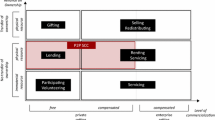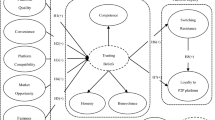Abstract
This paper examines how sustainable consumption behaviours are assembled in peer-to-peer (P2P) platforms, based on four factors—services portfolio complexity, network membership, reputation and innovative practices—and its impact on P2P platform performance. Using data from one P2P accommodation platform in Romania and based on 2556 observations, we tested the research hypothesis using ordinary least squares regression. Specifically, services portfolio complexity positively influences sustainable consumption behaviours, while network membership has a negative influence. Services portfolio complexity has a positive influence on sustainable consumption behaviours when innovative practices are high. Finally, sustainable consumption behaviours positively influence P2P platform performance.




Similar content being viewed by others

References
Amit R, Zott C (2001) Value creation in E-business. Strateg Manag J 22:493–520
Antonetti P, Maklan S (2014) Feelings that make a difference: how guilt and pride convince consumers of the effectiveness of sustainable consumption choices. J Bus Ethics 124:117–134
Ba S, Pavlou PA (2002) Evidence of the effect of trust building technology in electronic markets: value premiums and buyer behavior. MIS Q 26:243–268
Bauwens M, Kostakis V (2017) Peer-to-peer: a manifesto for commons transition. Westminster University Press, London
Ceptureanu EG, Ceptureanu SI (2019) The impact of adoptive management innovations on medium-sized enterprises from a dynamic capability perspective. Technol Anal Strateg Manag. https://doi.org/10.1080/09537325.2019.1587160
Cheema A (2008) Surcharges and seller reputation. J Consum Res 35:167–177
Cohen B, Munoz P (2016) Sharing cities and sustainable consumption and production: towards an integrated framework. J Clean Prod 134:87–97
Doney PM, Cannon JP (1997) An examination of the nature of trust in buyer-seller relationships. J Mark 61:35–51
Duysters G, Lokshin B (2011) Determinants of alliance portfolio complexity and its effect on innovative performance of companies. J Prod Innov Manag 28(4):570–585
Emekter R, Tu Y, Jirasakuldech B, Lu M (2015) Evaluating credit risk and loan performance in online peer-to-peer (P2P) lending. Appl Econ 47(1):54–70
Fernhaber SA, Patel PC (2012) How do young firms manage product portfolio complexity? The role of absorptive capacity and ambidexterity. Strateg Manag J 33(13):1516–1539
Fremstad A (2018) Is there a future for sharing? A comparison of traditional and new institutions. J Inst Econ 14:595–616
Heinrichs H (2013) Sharing economy: a potential new pathway to sustainability. GAIA 22:228–231
Joo S, Lee H, Suh E, Suh K (2017) Shared experience in pretrip and experience sharing in posttrip: a survey of Airbnb users. Inf Manag 54:714–727
Kozlenkova IV, Palmatier RW, Fang EE, Xiao B, Minxue H (2017) Online relationship formation. J Mark 81:21–40
Kuhn KM, Galloway TL (2015) With a little help from my competitors: peer networking among artisan entrepreneurs. Entrep: Theory Pract 39:571–600
Leary RB, Mittelstaedt J, Murphy PE (2014) Changing the marketplace one behavior at a time: perceived marketplace influence and sustainable consumption. J Bus Res 67:1953–1958
Martin CJ (2016) The sharing economy: a pathway to sustainability or a nightmarish form of neoliberal capitalism? Ecol Econ 121:149–159
Mccollough J (2010) Consumer discount rates and the decision to repair or replace a durable Product: a sustainable consumption issue. J Econ Issues 44:183–204
McKelvie A, Wiklund J (2010) Advancing firm growth research: a focus on growth mode instead of growth rate. Entrep Theory Pract 34:261–288
Pera R, Viglia G, Furlan R (2016) Who am I? How compelling self-storytelling builds digital personal reputation. J Interact Mark 35:44–55
Popescu DI, Alexandru A, Ceptureanu SI, Ceptureanu EG (2018) Analysis of MSEs in ICT domain from Bucharest-Ilfov County by using Nonaka-Takeuchi model. Stud Inform Control 27(1):107–116
Popescu DI, Ceptureanu SI, Alexandru A, Ceptureanu EG (2019) Relationship between knowledge absorptive capacity, innovation performance and information technology. Case study: the Romanian Creative Industries SMEs. Stud Inform Control 28(4):463–475
Powell WW, Koput KW, Smith-Doerr L, Owen-Smith J (1999) Network position and firm performance: organizational returns to collaboration in the biotechnology industry. Res Sociol Organ 16:129–159
Prothero A, Dobscha S, Freund J, Kilbourne WE, Michael G, Ozanne LK, Thøgersen J (2011) Sustainable consumption: opportunities for consumer research and public policy. J Public Policy Mark 30:31–38
Raju S, Chandrasekaran M (2019) Performance analysis of efficient data distribution in P2P environment using hybrid clustering techniques. Soft Comput. https://doi.org/10.1007/s00500-019-03796-9
Sahakian M, Wilhite H (2014) Making practice theory practicable: towards more sustainable forms of consumption. J Consum Cult 14:25–44
Sigala M (2014) Client involvement in sustainable supply chain management: a research framework and implications in tourism. Cornell Hosp Q 55:76–88
Spaho E, Sakamoto S, Barolli L, Xhafa F, Ikeda M (2014) Trustworthiness in P2P: performance behaviour of two fuzzy-based systems for JXTA-overlay platform. Soft Comput 18(9):1783–1793
Sun J (2014) How risky are services? An empirical investigation on the antecedents and consequences of perceived risk for hotel service. Int J Hosp Manag 37:171–179
Tallman S, Jenkins M, Henry N, Steven P (2004) Knowledge clusters and competitive advantage. Acad Manag Rev 29:258–271
Trudel R, Arg JJ, Meng MD (2016) The recycled self: consumers’ disposal decisions of identity-linked products. J Consum Res 43:246–264
Tussyadiah IP, Zach F (2017) Identifying salient attributes of peer-to-peer accommodation experience. J Travel Tour Mark 34:636–652
Valdés L, Montesinos S, Ariza A, Allende SM, Joya G (2015) Peer selection in P2P wireless mesh networks: comparison of different strategies. Soft Comput 19(9):2447–2455
Wiles A, Crawford A (2017) Network hospitality in the share economy/understanding guest experiences and the impact of sharing on lodging. Int J Contemp Hosp Manag 29:2444–2463
Yates L (2018) Sharing, households and sustainable consumption. J Consum Cult 18:433–452
Ye W, Cho K (2017) P2P and P2P botnet traffic classification in two stages. Soft Comput 21(5):1315–1326
Acknowledgement
This work is supported by a grant of the Romanian National Authority for Scientific Research and Innovation, CNDS-UEFISCDI, project number PN-III-P4-ID-PCCF-2016-0084.
Author information
Authors and Affiliations
Corresponding author
Ethics declarations
Conflict of interest
This article does not contain any studies with human participants or animals performed by any of the authors.
Additional information
Communicated by M. Squillante.
Publisher's Note
Springer Nature remains neutral with regard to jurisdictional claims in published maps and institutional affiliations.
Rights and permissions
About this article
Cite this article
Ceptureanu, E.G., Ceptureanu, S.I., Herteliu, C. et al. Sustainable consumption behaviours in P2P accommodation platforms: an exploratory study. Soft Comput 24, 13863–13870 (2020). https://doi.org/10.1007/s00500-020-04681-6
Published:
Issue Date:
DOI: https://doi.org/10.1007/s00500-020-04681-6



